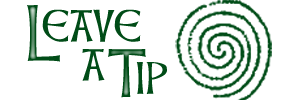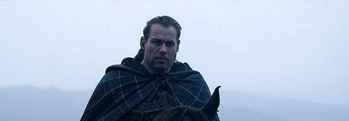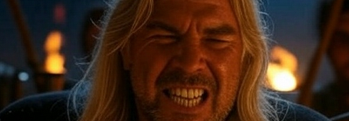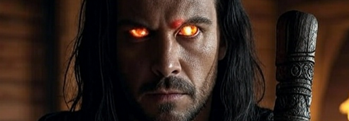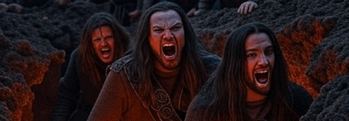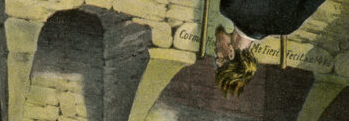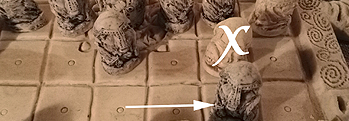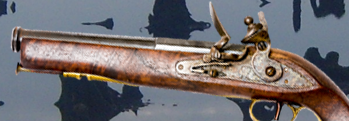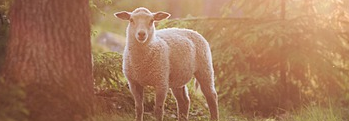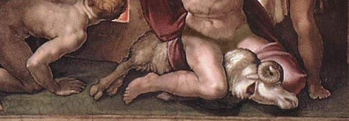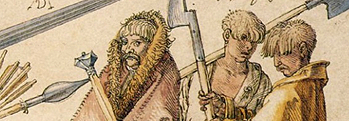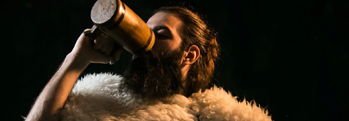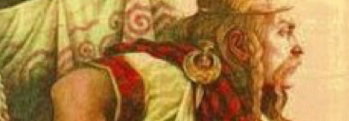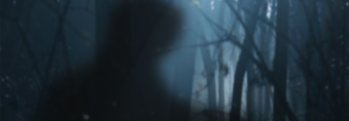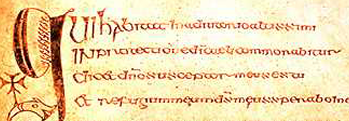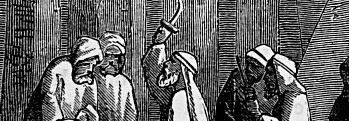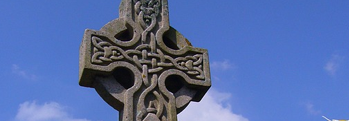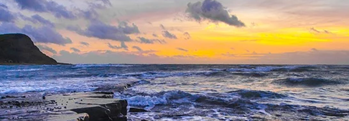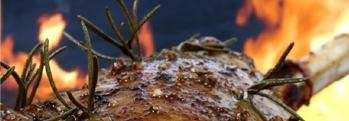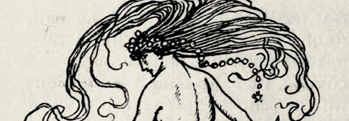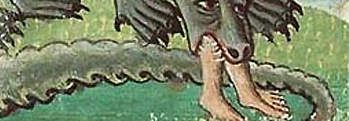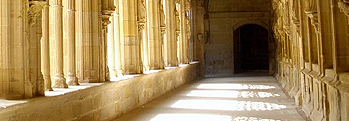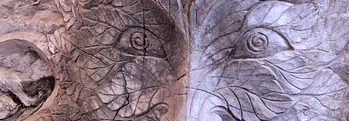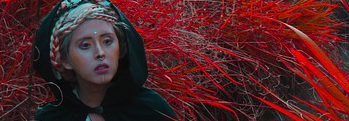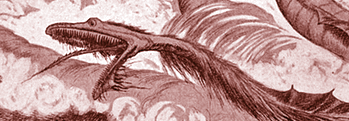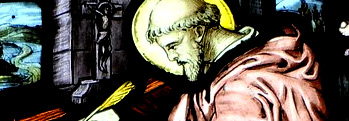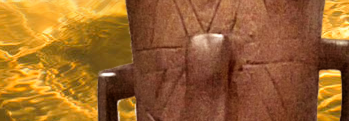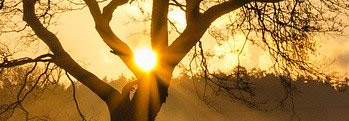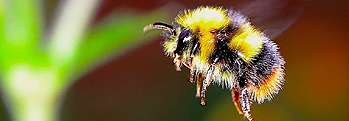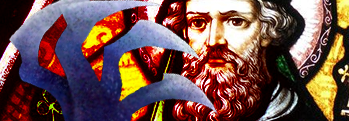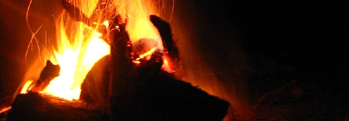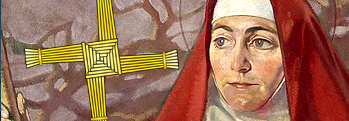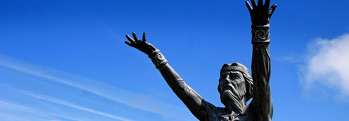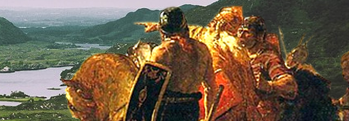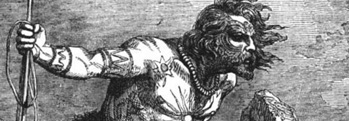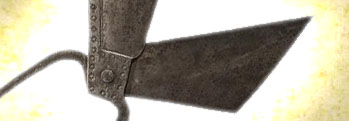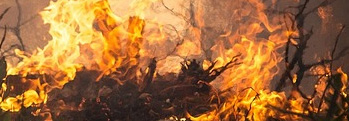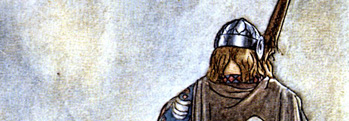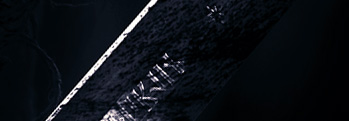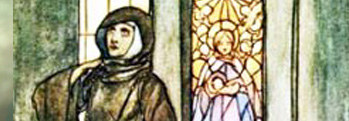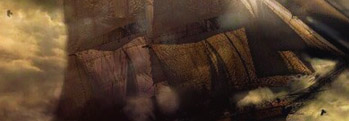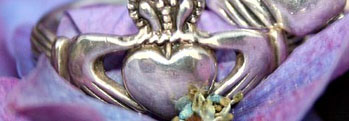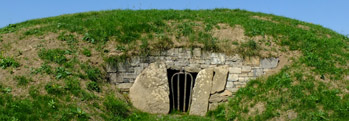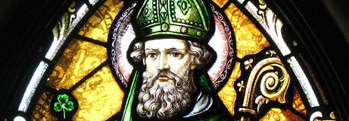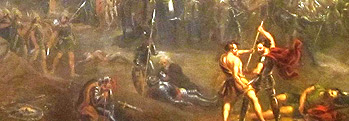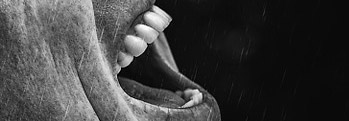The Breaking of Seven Geases
Irish and Celtic myths and legends, Irish folklore and Irish fairy tales from the Historical Cycle
Seven prophecies of warning broken
It was the custom in Ireland of old to lay geases upon champions, heroes and warriors. These were magical forbiddings, deeds they must not do or disaster would follow, and no disaster fell so hard upon a man who broke his geases as upon Conaire Mor!
His mother was a woman of the Sidhe called Etain, who had been married to King Eochaid, but discovered that she was previously married to the fairy prince Midir, and so made away with him to the lands under the mound. Eochaid was heartbroken and couldn't bear to look at the child who reminded him of his wife so much, and so he ordered the child slain, and the Sidhe places destroyed where they could be found.
His men dropped her down a well but she smiled so sweetly up at them that they couldn't stand to do the deed. Instead they gave her to shepherds, who called her Meas Buachalla and put her in a house with no windows, doors or roof so that none could harm her, but they left the roof off so she wouldn't feel imprisoned.
And so she grew up, more beautiful than any woman in Ireland before, although none laid eyes on her.
The druids at the court of Tara had foretold that High King Eterscele would marry a woman whose race and family were known to none. These words baffled the king, but he told his men to watch for such a creature as they went about their business, and sure enough before too long they came to a house with no windows or doors. Climbing one atop the other, they peered over the walls and saw Meas Buachalla looking back at them, and the High King had himself a wife.
But before they could fetch her out, a great bird flew into her house and changed into a handsome young man. He declared himself the King of the Birds and lay with Meas Buachalla, telling her after that she would have his child, and so it was – the High King thought the babe was his own son, and raised him as such.
The boy was called Conaire and was much loved by his parents, and he grew up with three foster brothers, from whom he was inseperable. No matter what they did, it was done together, eating, playing, riding horses or training for battle.
One day the four were out hunting when they spied a great flock of huge birds landed not far off, so Conaire thought he'd bring one down for the dinner table, but as he drew closer the birds took flight and flew a little distance away. He gave chase to the ocean's edge, but when he finally had a good shot at one, they shed their feathers and became tall, stern men.
Their leader was angry with him and told him that he had a geas never to kill a bird. Well Conaire was as surprised as you could imagine, and asked if he had any other geases he didn't know about. The Bird King told him he'd have a long and happy life, but there were six things and one he must not do.
He was not to permit pillaging in the land.
He was not to stay out more than nine nights in a row from Tara.
He was not to go rightwise round Tara, nor leftwise round Bregia.
He was not to hunt the evil beasts of Cerna.
He was not to let three red men go before him to the house of a red man.
He was not to let a solitary woman come into a house where he was after sunset.
And then the Bird King told him to walk naked back to Tara. Now the High King had died while they were out hunting, but it wasn't the custom that his son should take the throne as it was for lesser peoples. Instead the chief druid must eat of a slaughtered bull at his wake, and drink all of its blood.
In the heat-trance of the eating, the druid would see the next high king, and when he awoke the druid said a naked man would walk in the door to be the king. Next thing you know, in walks Conaire wearing nothing but what he'd got from his parents, and the deed was done!
For many years he reigned in peace and prosperity, and all the land was merry, save only for his foster brothers, who had taken it into their heads that they were above the law. But Conaire loved so well the trio that he said “Let every father slay his own son, but let my foster-brothers be spared!”
And so he broke his first geas – pillaging and raiding took place under his rule. But in the end their infamies grew too great to be ignored, so he raised his protection from them, and they fled to the dark oceans east of Ireland. On their ship they met Ingcel one-eye, himself an outlaw, and they raided Britain, slave-taking and slaughtering where they would.
But in one of their raids they accidentally burned Ingcel's own father and brothers alive, so Ingcel demanded reparations, a raid on their own land of Ireland. They beached their ships and they landed, a force of fierce marauders, upon the plain of the Liffey, south of Tara.
Seeing in the distance a fine house, Ingcel declared he'd like to plunder it, but Ferrigan, one of Conaire's foster brothers, replied that it was an ill deed to attack a guest house. Ingcel said the earth would crack open before he'd turn aside from his purpose, and so the villainous host marched on that place, called Da Dearga's hostel.
On that night King Conaire was travelling back from settling a dispute between two of his chiefs, and sore troubled he was too, for the negotiations had taken him nine days, and this was the tenth night he was beyond Tara's walls, so another geas was broken.
As he went with his men, he spied in the distance fire rising from the fields of the Liffey plain as the raiders pillaged acorss the land, and to reach them by the straightest route he had to go rightwise round Tara, and leftwise round Bregia. In the coils of acrid blinding smoke strange beasts reared up before him, and he slew them handily – not knowing they were the evil beasts of Cerna!
And so two more of his geases were broken.
By the light of rising flames he saw three men clad all in red, on red horses galloping past him towards the hostel, or perhaps it was only by the ruddy glow of the flames that they seemed so. Knowing he shouldn't let them enter the hostel before him – for Da Dearga means “the red man” - as it would break another geas of his, he cried out for them to stop.
They paused and looked at him strangely, and a chill ran through him when their eyes lit upon him.
“A gathering at a hostel, great the destruction, great the tidings!” Again Conaire cried to them to turn back for the sake of the great reward that would be given them. Then the riders sang out “Weary are the steeds we ride, the steeds from the Land of the Sidhe. Though we are living, we are dead. Great are the signs, destruction of life, sating of ravens, feeding of crows, strife of slaughter, wetting of sword-edges, shields with broken bosses after sundown. Lo, my son!”
And they went within the hostel and seated themselves before Conaire, breaking his geas as he entered after them.
Conaire went in and sat upon the couch. The mantle that was about him was even as the mist of a May day: diverse were the hues and semblances each moment shown upon it. A hand's breadth of his sword was outside its scabbard, and a man in front of the hostel might see by the light of the blade. The colour of the king's hair was like the sheen of smelted gold. Beside him was his little son - a small, freckled lad in a purple cloak, he was loved by all.
 Strange were the visions that Conaire saw by shimmering firelight - he saw a man who had only one eye, one foot, and one hand. He knew him for the Swineherd of Bodb Dearg, and he knew that ruin was wrought at every feast at which he was present. And shapes more dreadful yet were shown him. He saw the Daughters of Bav - those three that are slaughtered at every destruction. Naked and bleeding, they hung by ropes from the roof.
Strange were the visions that Conaire saw by shimmering firelight - he saw a man who had only one eye, one foot, and one hand. He knew him for the Swineherd of Bodb Dearg, and he knew that ruin was wrought at every feast at which he was present. And shapes more dreadful yet were shown him. He saw the Daughters of Bav - those three that are slaughtered at every destruction. Naked and bleeding, they hung by ropes from the roof.
In a vain attempt to cheer the king before the coming battle, his juggler played and danced through the hazy phantasms, but all fell still as the door boomed with three mighty knocks!
A peculiar and unpleasant woman was there, and she demanded entry to the hostel. Conaire refused, loathe to break yet another geas, but by the laws of hospitality she prevailed, although the company looked on her with great revulsion. With that, they leaped to their feet as something sailed through the smoke-hole – it was Ferrigan's head! And the king wept to see the ruin that was made of his foster brother by treachery three times around.
Giving that as a sign, the reavers attacked the hostel, firing spears and arrows through every crevice, but Da Dearga's house was not without its own warriors! From beneath it burst a terrible band of ferocious giants, whose dress was of rough hair, who had girdles of ox. hide, and who were armed with flails - each flail they wielded had chains of iron triple-twisted. These were the giants that had been taken by Cúchulainn at the siege of Faldal.
But crafty old Ingcel called to them and struck a bargain with them, so they dammed up the river that flowed through the hostel and blazing torches were hurled onto the roof. Conaire's men poured out in a fury of glittering steel, and wrought savage injuries upon the marauders, but in the smoke and confusion they were led far from the battle by a piper clad in red, playing Sidhe music.
In the furious heat a deep thirst came upon King Conaire, and his champions took his golden cup through the ranks of attackers, seeking to fill it and bring it back to their king. Meanwhile, Conaire had armed those who remained and even the juggler who stood dismayed.
Mad he was, and the mad see things we cannot, so he cried that the people of the De Danann were angry with King Conaire over the destruction King Eochaid had laid upon their places in his search for his wife. The giants, enspelled by Sidhe pipes, turned and attacked the King's warriors, while his champions searched in vain for water. But the rivers and lakes of Ireland listened to the old music of the Sidhe and hid themselves from the searchers.
At last one champion, MacCecht, found a lake that hadn't heard the tidings yet and filled the King's cup to the brim, returning to find all the defenders dead and the King's head being struck from his shoulders.He killed the raider and poured the water into the King's head, which spoke its last words, praising him for his courage and devotion.
Conaire's son was found the next day without a hair on his head being harmed, and he was carried away from the smouldering ruins. As he stood by the burning hostel he heard the red pipers chanting to each other: “Great the tidings! Through ancient enchantments a company has perished. Until this was accomplished we might not return. Now we ride the horses of Donn Tetscorach, the horses of Midir's son. Now we ride back to the Land of the Ever-living!”
On the map below is marked near Da Dearga's hostel should you wish to visit!
More Tales from the Historical Cycle
A beautiful new font has been developed which allows you to type in Ogham on your computer! Dustin A. Ashley in association with Dr. Adam Dahmer are pushing the boundaries of Gaelic culture outwards into new and exciting territory, read on to learn more: "Within Gaelic culture, there is a long-standing tradition where lang ... [more]
High King Conn of the Hundred Battles, which in the way of the old people of Ireland meant battles without end rather than an exact measure and count of every affray he had been in, had overthrown all of the lesser kings of Ireland, the lords of the five Kingdoms and the lesser realms, and he had taken his seat in Tara. Not easy did he sit eithe ... [more]
Conn Cétchathach, or Conn of the Hundred Battles, was as his name suggested a mighty warrior-king of ancient Ireland. Some say it was after him that the province of Connacht was named, and he was made king after he accidentally stepped on the Lia Fáil, the coronation stone at Tara. It had been cast aside, lost, half buried and used as ... [more]
Mongán mac Fíachnai was a prince of the Gaels, none other than he whose father was Fíachnae mac Báetáin, and it was about the seventh century in Ireland when he ruled over Ulster. Many are the tales told of him and his royal reign, with some even whispering that he was the son of Manannán mac Lir, ancient G ... [more]
Díarmata mac Cerbaill was the last pagan High King of Ireland, who made his seat at Temair and followed the ancient rituals of inauguration, including the ban-feis or marriage to goddess of the land. His reign was a strange one where the mysteries of ancient Ireland vied with the light of Christianity and many powers rose and fell, often by ... [more]
Many centuries ago, on a windswept and hostile rock in the North Sea, a place called Iona, the great monk, philosopher and evangelist Colmcille founded a monastery. Men devoted to the new faith worked with fervour, bending their backs to hew from the pitiless stone, amid bleak and harsh weather, a place for worship and meditation upon the saviour o ... [more]
The extraordinary Ballintubber Abbey, known as Tobar Padraic in the Annals of the Four Mastersm is almost a thousand years old, having been built by King Cathal Crobdearg Ua Conchobair - whose father commissioned the beautiful Cross of Cong - in 1216. It has survived ages and centuries of persecution and fire, providing a place for people to visit ... [more]
One of the most imposing legacies of the last of the mighty megalith-builders of the Neolithic and Bronze ages, the Dolmen of the Four Maols, considered by some to be a cist tomb rather than a dolmen or portal tomb. An enormous capstone sits above three other stones, while the entry stone lies not far off. It was once covered by a cairn of smaller ... [more]
The gift of the gab, as it’s known, is a common thing among the Irish – being able to talk all day about anything and everything, and do it in a way that would have you listen as well. It’s as Irish as red hair and freckles. But what if you didn’t have the gift of the gab, or felt a deficiency of gabbiness? Never fear, al ... [more]
We are delighted to be able to present to you the rules of Fidchell, the Irish game of kings! This game can be purchased, but it's easy to get started and try it out for yourself. All you need is a 7 x 7 board, which can be squares or pins marked out - even on paper - 16 white or attacker pieces, a king piece, and 8 darker-coloured defender pie ... [more]
Ireland is full of strange little corners and odd byways that only a few know about, and one such is a mysterious place called the Gearagh, or An Gaorthadh, meaning the wooded river bed, in County Cork. Once it was part of the first forests in Ireland, home to verdant giants that grew after the great ice melted away, but now all that remains is a s ... [more]
Ireland at the beginning of the first millenium was a turbulent place, with many clans and kingdoms fighting among themselves, so that a Lord might be sitting comfortably one day but find himself fleeing for his life the next! And so it was with one of the greatest of Ireland's kings, Cormac Mac Art. Although he was by blood, law and custom ... [more]
On Martinmas eve, that is to say the 10th of November, it used to be the custom in many parts of Ireland to sacrifice an animal to Saint Martin of Tours! This tradition has only recently ceased, having been carried on well into living memory, as lately as the 1940s in some places. In poorer homes a goose, gander, duck or chicken was killed, whil ... [more]
It's true to say that music has a magic all to itself, for it can transport us to different places and times with the strumming of a few notes. It can make us feel angry, or sad, or happy, or any one of a myriad of other emotions. But if you were to hear the music of an occult Sidhe instrument played by one of the fairy folk under a loon's ... [more]
King Cormac Mac Airt was one of the mightiest kings of Ireland, known and well known for his wisdom, but after he lost an eye in a battle with the Déisi, he had to step down, for the solemn law was that a king must be without blemish. His son Cairbre came to him to ask his advice before in turn being crowned king. “O Cormac, grandso ... [more]
"Crom Cruach and his sub-gods twelve," Said Cormac "are but carven treene; The axe that made them, haft or helve, Had worthier of our worship been. "But He who made the tree to grow, And hid in earth the iron-stone, And made the man with mind to know The axe's use, is God alone." Anon to priests of Crom was ... [more]
Most people with an interest in Irish mythology and legends will have heard of the great tale of the Táin Bó Cúailnge, which tells of the heroic deeds of Cú Chulainn as he resisted and gave battle single handed to the armies of Queen Medb. What most don't know is that the ancient tale was once all but lost, for th ... [more]
One of the most legended and powerful relics of ancient Ireland was the Cathach, or battle-book of St Colmcille, who was also known as St Columba. A Cathach was really any sort of sacred or magical artifact, and great was the strife between the tribes and clans of Ireland to gain ownership of them! The psalter or prayer book of Saint Colmcille w ... [more]
Three was a sacred number to the people of ancient Ireland, bearing with it a hint of magic and the sacred, and this belief carried through to their spiritual practices, which occasionally included human sacrifice! Most cultures throughout history have at one point or another practised some form of human sacrifice, and lurid tales passed down fr ... [more]
Saint Colman was a famous Saint in early Irish Christianity, being born a prince not long after Saint Patrick brought the faith to Ireland in the first place. Despite his royal lineage however, his birth was no easy matter, for the druids had prophecised darkly that he would be a great man and surpass all others of his clan! His pregnant mother ... [more]
The old pagan times in Ireland were fraught with peril for even the mightiest warriors, with chieftains and tribes going to war often and for many reasons – pride, hatred, love and greed! And so it was with the fierce King Conall Collomrach. Little is known of his exploits, but his reign was brief and his end was violent, leaving behind only ... [more]
This now is the true tale of mighty King Cathal Mac Finguine of Munster, lord of Cork and warrior without peer. In ancient Ireland this story was told when mead was first brought out, or a prince sat to his feast, or when an inheritance was taken, and the reward for reciting this story was a white-spotted, red-eared cow, a shirt of new linen, or a ... [more]
The river in Meath which we today know as the Delvin, that very same river which flows into the Irish sea in Gormanstown, was not always called so. In the time of Kings it was called Inbher Oillbine, and this is the grim story of how it got that name. There was a prince who lived near to the mouth of the river, and his name was Ruadh Mac Righdui ... [more]
The boy who was to be Saint Colman was born in the northern kingdom of Dalriada, which held both Northern Ireland and Scotland in its power at the start of the sixth century. This was the time of the dawn of Christianity in Ireland, and it was a time when great terrors and monsters from primordial epochs still swam in the deep lakes and lazy rivers ... [more]
Most people have heard of Ireland's famous title, “The Island of Saints and Scholars”, and the reason it was so well known was because of the many fine Irish Catholic universities and colleges that preserved and spread learning throughout Europe. Of them all, there were few finer than the one in Howth, and so wonderful was its reput ... [more]
Very often here in Ireland we walk past the most astonishing buildings, carven stone high crosses, ancient temples and many similar things, but rarely do we wonder who built them. Well as it turns out, legend has it that a surprising number of them were built by a man called Gobán Saor, whose name means “Gobán the Builder,&rdquo ... [more]
I. Once upon a time there was a High King in Ireland by the name of Conn the hundred-fighter, for so many battles had he fought and won to gain his kingship. At the end of his reign was Fionn Mac Cumhaill born. Long was Conn's lineage, although I won't trouble you with the details, but he reigned at Tara of the Kings as Lord of all Irela ... [more]
In the time of High King Lugaid Luaigne, that is around the age when Fionn Mac Cumhaill and his Fianna fought in defence of the great land of Ireland, a dispute arose in the northern Kingdom among the men of the Ulaid, for instead of there being only one king of Ulster, there were two! Well, as anyone who knows anything about kings will tell you ... [more]
St Colmcille is one of the three patron saints of Ireland, and his life is the subject of story and legend. It was by his efforts that Christianity spread not only through Ireland but also Scotland, England and parts of Europe too! He was a tall and powerfully built man with a rich and melodious voice which, it was said, could be heard from one hil ... [more]
From the earliest times and in every corner of the world, mead was held in reverence. This sweet tasting fermented honey drink was especially loved by the ancient Irish, who shared fireside stories about rivers of mead in mystical lands over the edge of the ocean's horizon, ruled by Mannanan Mac Lír, and even in the place where the dead ... [more]
Ancient are the hills and mountains of Ireland, and ancient are her trees, something that the old people who lived here knew well. To them a tree was a mystical thing with its roots reaching down into the underworld of the sidhe mounds, and its branches lifting up high into the heavens towards the sun, moon and stars. Well over ten thousand places ... [more]
The Irish bee has been a beloved part of the culture and folklore as long as there have been people in Ireland, producing honey for cakes and mead as well as beeswax which has no end of uses. Many's the warm summer evening has been filled with their gentle humming above the beautiful flowers they help to pollinate. And yet for all that, old ... [more]
As Saint Patrick travelled across Ireland, spreading Christianity and the light among the pagan tribes, he saw many wonders and defeated many evils, but always more rose up to challenge him. So he took himself to prayer and saw a vision that he should travel to Croagh Patrick – although it was not so known at that time – and spend the L ... [more]
The shifting shadows of pagan times held sway over Ireland when the High King was a man known as Laoghaire, famed for his merciless fury and great strength, and he sat upon the seat of the High Kings in Tara. But unknown to him, Saint Patrick had landed in a little boat at Colpe in the Boyne estuary, travelling to a place called Ferta fer Feic, or ... [more]
One of the three patron Saints of Ireland, along with Patrick and Colmcille, St Brigid of Kildare was a devout Catholic in the very first days of the faith in Ireland. Her feast day is the first of February, which previously had been the pagan festival of Imbolc, halfway between winter and spring. Brigid herself was the daughter of a baptised Ch ... [more]
Through many an ancient legend and tale rings the name of the fierce and powerful druid called Mogh Ruith, meaning “slave of the wheel”. Older legends make him out to be the king of the Fir Bolg, or a druid gifted with many lives by the fairies, or that the name was but a title passed down through generations. Some say he had one eye ... [more]
Ireland has had many high kings, some were wise and kind and others cruel and the holders of grudges, but there were few as great as High King Cormac Mac Art, grandson of Conn of the Hundred Battles and son of Art and Ectach, the daughter of a mighty blacksmith. In his youth he stayed at the hall of the king of the north, Fergus Dubhdedach, but ... [more]
Back in the days of old Ireland when legends walked the earth, before the light drove back the shadows of ancient aeons, the word of a bard was much feared, for the people had no writing, so all of their culture and histories were held in songs and poems by bardic masters. As you can imagine even the mightiest were wary of getting on the wrong s ... [more]
In ancient days there was an Irish King whose name was Labraid Lioseach, known also as Labraid the Sailor for a long voyage he took into fairy seas, and when he came back from that voyage he was never seen without a deep hood over his head, except by one man. That man saw him once a year to trim his hair, and after the King's hair was cut, t ... [more]
It was the custom in Ireland of old to lay geases upon champions, heroes and warriors. These were magical forbiddings, deeds they must not do or disaster would follow, and no disaster fell so hard upon a man who broke his geases as upon Conaire Mor! His mother was a woman of the Sidhe called Etain, who had been married to King Eochaid, but disco ... [more]
Tierna the Historian was one of the many chroniclers and monks who wrote the tales of ancient Irish legends, telling us of strange and notable events in the almost forgotten past, the deeds of heroes and kings, and in one case, the disappearance of the High king himself! For it was by Tierna's hand we know that High King Cormac went missing for ... [more]
In the time between the Tuatha Princes and St Patrick, there rose over the people of Ireland mighty High Kings, who held power by force of arms, wit and wisdom. One of the greatest among them was Cormac of the wide purple cloak, whose hair was as golden as the heavy torc around his neck, with teeth like a shower of pearls and skin as fair as snow. ... [more]
Long ago when the fierce Milesians invaded Ireland and defeated the De Danann after many wars and battles, despite their sorceries and all their courage, skill and sciences, the folk of Danann made for themselves eldritch amulets and charms by which they and all their possessions became invisible to mortals, and so they continued to lead their old ... [more]
The Tailteann games were a grand affair in Ireland once upon a time, every bit as celebrated and renowned as the Olympics are today. Having their roots thousands of years earlier, in the time of the Tuatha Dé Danann, lakes were made and gigantic fires were lit during Lughnasadh, the summer feast in July. Druids and poets would compose cea ... [more]
The Claddagh Ring is one of those well known emblems of Ireland that most people recognise, but how many know the stories behind it? Many's the young man has gifted one to his lady, giving his heart along with it, as did the ring's original maker. Back in the seventeenth century there was a young Irish lad by the name of Richard Joyce, w ... [more]
Ah Tara, Temair of old, seat of more than a hundred High Kings of Ireland for better than a thousand years, home to the royal lines of Cormac and Tuathal, where is your wisdom and beauty? Where are the mighty warriors and poets who once danced in your halls? Why now do cattle and livestock graze where the mighty Fionn faced the Tuatha sidhe with a ... [more]
On Easter Sunday morning, in anno domine 433 it was that Patrick came face to face with the beating heart of the old religion at Tara, and did battle with the Druids. Although some might dispute the miraculous nature of the events that took place on that day, few argue they didn't happen, so take from that what you will! Laeghaire the king a ... [more]
Brian Boru was one of the greatest High Kings of all Ireland, a Christian king whose small dynasty challenged and broke even the power of the O'Neills, who had ruled Ireland from time immemorial. He rose to prominence at a time when the cruel Norseman was pillaging the lands of both Ireland and England, slaughtering and slave-taking, barbarians ... [more]
King Suibhne was master of the northern land of Dalriada in Ulster, and a grim and fierce king he was too, yet fair to behold like palest snow, with deep blue eyes. A mighty master at arms, he was called to war often, but latterly to the bloody battle of Moy Rath. As he readied himself he heard in the distance a church bell ringing, and no man of G ... [more]


